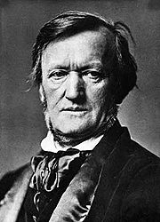
composer
, conductor
, theatre director, philosopher
, music theorist
, poet
, essayist and writer
primarily known for his opera
s (or "music dramas", as they were later called). Wagner's compositions, particularly those of his later period, are notable for their complex texture
, rich harmonies
and orchestration
, and the elaborate use of leitmotif
s: musical themes associated with individual characters, places, ideas or plot elements.
Music has taken a bad turn; these young people have no idea how to write a melody, they just give us shavings, which they dress up to look like a lion's mane and shake at us... It's as if they avoid melodies, for fear of having perhaps stolen them from someone else.![]()
It should not be presumed that these people (the Jews), who are so separated from us by their religion, have any right to make our laws. But why blame the Jews? It is we who lack all feeling for our own identity, all sense of honour.![]()
I am writing Parsifal only for my wife -- if I had to depend on the German spirit, I should have nothing more to say.![]()
Oh, I hate the thought of all those costumes and grease paint! When I think that characters like Kundry will now have to be dressed up, those dreadful artists' balls immediately spring into my mind. Having created the invisible orchestra, I now feel like inventing the invisible theatre!![]()
Certain things in Mozart will and can never be excelled.![]()
This is Alberich's dream come true -- Nibelheim, world dominion, activity, work, everywhere the oppressive feeling of steam and fog.![]()
It is necessary for us to explain the involuntary repugnance we possess for the nature and personality of the Jews....![]()
The Jews have never produced a true poet. Heinrich Heine reached the point where he duped himself into a poet, and was rewarded by his versified lies being set to music by our own composers. He was the conscience of Judaism, just as Judaism is the evil conscience of our modern civilization.![]()
I believe in God, Mozart, and Beethoven.![]()
I hate this fast growing tendency to chain men to machines in big factories and deprive them of all joy in their efforts - the plan will lead to cheap men and cheap products.![]()

